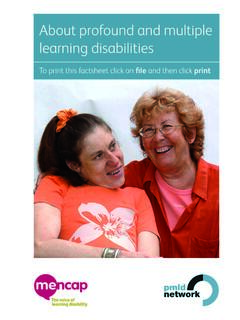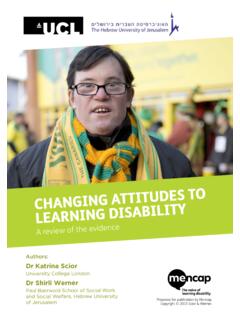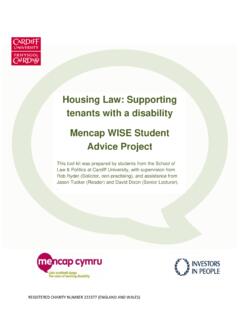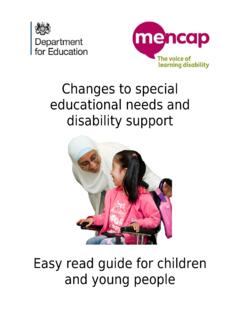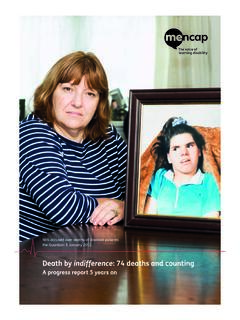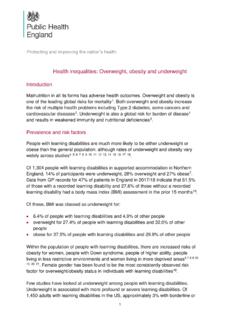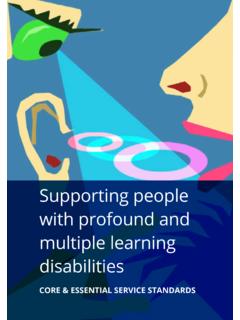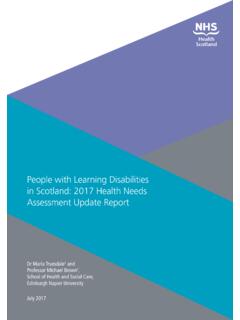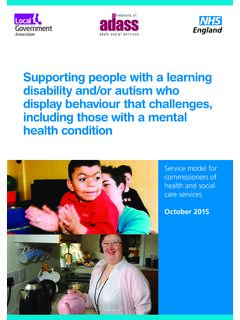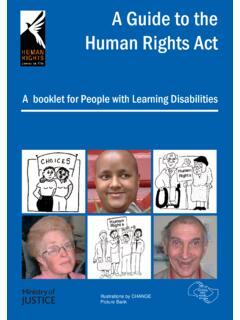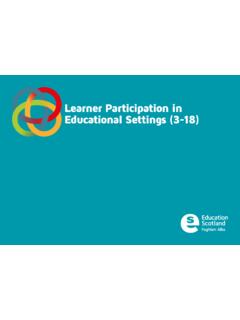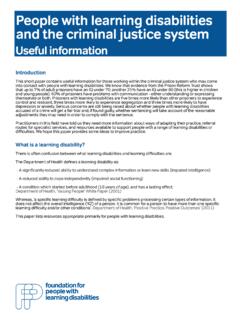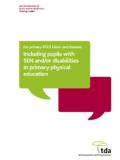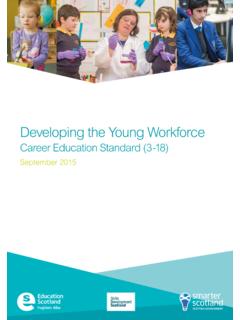Transcription of Learning Disabilities, Autism and Internet Safety
1 This guide enter blurb This guide enter blurb Learning disabilities , Autism and Internet Safety :A Guide for ParentsThis guide outlines some suggestions to help parents limit the risk of their child having negative experiences oline and understand what action can be taken if they Cerebra we believe that being a family is about discovering life s no different for families of a child with a brain condition except that there are more chal-lenges to overcome along the way. We believe the best way to overcome them is by joining families on that journey at every step. First we use what they tell us to inspire the world class research and innovation that Cerebra supports. Then we work with them to make the best use of the knowledge we develop.
2 So that they can go on to discover a more included, fulfilled and enjoyable life. This guide is provided free of charge but if you would like to make a donation to help cover the costs of research and updating, it would make a huge difference. To donate by text send CERE12 and then the amount to 70070, or telephone our Fundraising Department on 01267 244221. The information in this guide was originally written by Elizabeth Archer. Reviewed by Emma Thomas of the Cerebra in-house Research kindly reproduced with permission from Gemma Griffiths PhotographyThis guide is part of a series of guides published by Cerebra that aim to give parents of children with disabilities and/or special educational needs information on how to get the help and support they need.
3 This series of guides can be found on the Cerebra website: Charity no. 1089812 Cerebra disabilities , Autism and Internet Safety : A Guide for Parents IntroductionThis guide outlines some suggestions to help parents limit the risk of their child having negative experiences online and understand what action can be taken if they do. This guide also suggests some resources that will help children get the most out of the Internet at home and in the community. The guide will present some case studies of actual experiences people with Learning disabilities and Autism have had online and Learning points that can be taken from these is in this guide?1. Making your home Internet safe2. Making mobile Internet safe3. Preparing your child to use the Internet4.
4 Risks: Dealing with cyberbullying5. Risks: Privacy and preventing grooming6. Risks: Antisocial behaviour and criminal activity7. Risks: Spending money online8. Benefits: Exploring special interests and Learning tools9. Benefits: Extended social network and access to peer support10. Benefits: Communication Charity no. 1089812 Cerebra 20154 IntroductionFamilies of children with disabilities often use the Internet as a key tool to keep them informed about their legal rights, appropriate treatments and services that might be available for their families. Parents often seek advice and support from online networking groups and forums and these can help us shape our plans for ensuring our children get the support they of the Internet is on the increase with million households in Great Britain having an Internet connection in 2015.
5 This represented 86% of As a society we shop online (in 2015, 76% of all adults purchased goods or services over the Internet2), socialise online (92% of 16 24 year olds use social networking sites3) and learn , children and young people are Learning and socialising using online resources. Many children with special educational needs are supported to use information technology in schools to allow them to access their education more successfully. Children use the Internet to do their homework, to play games and to socialise with their peers. My son who is 9 spends almost all of his time online gaming or creating, or lately doing a bit ofcoding. All self-taught and self-managed. He is home educated and apart from reading, this is hiseducation.
6 He has Autism and we want him to learn via his passions and interests. The Internet is his life and offers him fun, friendship, education, challenge and importantly, communication. I regularly thank my lucky stars that he was born in this era. Sometimes it seems the web or certain aspects of it and its constantly evolving games were made for a neurodiverse worry, as he gets older, about what he ll find as his searches widen but there is software I can install that will keep his imagination able to run free but protect him from the darker sides. The education needs to be for parents in how to allow freedom with appropriate protection. My son is 14 with Asperger s. He socialises online, makes friends across the world, chats directly tothem using head phones, exchanges badinage online, plays interactive the vast majority ofhis socialising is online, and here he is a normal, witty, fully accepted member of learns online and now knows much more about international politics, history, geography andreligion than most adults.
7 He learns far more effectively online than he does at school, and he hasinformation far beyond the limited syllabus at downside is that the online world, although it is a real world, is more alluring than face to faceinteraction with people . It is hard to get him to leave this comfort zone and walk the dogs in thesunshine or talk to his peers. Online he is relaxed and happy. Outside any number of unexpectedstressors may appear. It is the very limited, confined nature of the online world and the quiet roomwhich are its attractions. Online is have no worries about him being groomed, he has a mind of his own, and there is no chance setting up an inappropriate meeting - he wouldn t make it to the meeting point without light is a problem, focusing on only one distance for hours at a time cannot be good for his eyes, but also looking into a backlit bright computer screen late at night will be reducing or suppressing the melatonin in his body and making sleep harder.
8 He has melatonin prescribed, but I would like to get him off it earlier at night, and not to watch the television, which has the same is possible that he may be building up future repetitive strain injuries from long use of thecomputer without rest breaks. This is a relatively unknown area, but the continuous tiny movements are likely to be putting a strain on his tendons and muscles. He prefers to squat on his chair while online, which may be an unconscious strategy to help reduce the holidays he can be online for hours and it is certainly an addiction. We try to get him to do homework first thing at weekends, because once he is online we have lost him, and he will beirritated if pulled off, and rushing through work so that he can return.
9 However normal boys oftendisplay these traits in their concern to get out playing football with their mates. I used to disappearinto books for hours in a similarly addicted way as a child, blanking out the world around me,walking into lamp posts on my way to school because I read as I walked. There are real benefits to young people with Learning disabilities and Autism using the Internetto support Learning and social interaction. Increasingly the Internet caters for children and young people with Learning disabilities and Autism through using accessible design and simplified language, as well as instantly available video clips. For children with complex needs these can provide wonderful opportunities for Learning . Wow, how did you know the capital of scotland was Edinburgh?
10 I said to my son doing somegeography homework. Because the Chuckle Brothers went there, of course, don t you knowanything? he replied. Sometimes I just love You Tube. It is amazing how many old episodesfeaturing the Rotherham duo not to mention, Pink Panther, Scooby Doo and a host of others haveinformed his education. And where would we be without Annoying Orange? For someone withsuch a restricted diet thanks to some unfathomable sensory issues, he is able to name an incredible range of fresh produce and other food he would not normally come into contact with . Young people with Autism and other communication disorders often find Internet communication easier than face to face the Internet peoples use of consistent and easily recognisable emoticons replaces the need to decode people s body language, facial expressions and vocal tone that can be problematic in personal provides opportunities for Learning through repetition that supports children who take longer to learn new things and embeds the Learning they do in the classroom by undertaking activities as many times as they need to, in order to consolidate their Charity no.
